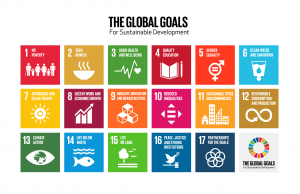Are you a student who values skills such as critical thinking, creativity, multi-perspectivity, intercultural learning and social engagement? Do you recognize that globalization comes with many issues, such as sustainability, displacement, technical (moral) dilemmas and infectious diseases, which will impact your professional practice? And are you interested in a program in which you learn from other disciplines (like health care, journalism, bioethics), cultures and practices in order to understand who you are or want to become in your personal and professional life? Do you enjoy experiential learning and being challenged? Then join the minor Beyond Borders: What it Means to be a Global Citizen!
Admission
You need to have at least a propaedeutic diploma (issued after the first year of university studies).
You can also follow this minor as a part-time student. Ask the minor contact person for the possibilities.
The Examination Board determines which minors do not have a higher professional education level and/or have an unacceptable overlap with the compulsory curriculum of your own study programme. Check at the page Not allowed minor courses under your institute which minors are not allowed. This page will be updated from 29 February for the 2024-2025 minor offer.
Content
This minor focuses on ‘world citizenship’ as a way to cope with globalizations’ challenges; an awareness that extends beyond the borders of your local or national community. It’s about insight in (inter)national developments, empathy with and respect for people from other parts of the world, reflection on the many connections between one’s personal situation and conditions elsewhere, plus the readiness to draw personal conclusions from them.
The minor has two important streams: World citizenship and personal development; it is all about your personal as well as professional position in society. You’ll work on an individual basis and in multidisciplinary groups. The minor uses a mixture of theory and practice. That means that in Block A you will have classes where teachers and guest lecturers will share the most recent knowledge about key themes related to world citizenship. But we will also work on practical problems in our current society using Challenge based learning. During these sessions you will have to find a solution for an existing problem with your group. An example in the past year was for example Black lives matter and racism. Excursions and study trips are also part of the program. In Block B the emphasis is on world citizenship in practice, when you will do a traineeship of your own choice. You will also work as a group on researching global challenges, reducing them to a localised question and presenting a case-focused solution.
To get an impression of this minor, you can watch the video below.
Learning objectives
During this minor, you will:
- learn to understand and reflect on what it means to be a global citizen;
- develop an understanding of how the challenges of globalization, nationalism and religion influence our society and what that means for your profession;
- become aware of the ethical and moral dimensions of world citizenship, by exploring the concept of (in)equality in our current society;
- experience what it means to be a world citizen through challenges and an international field trip to an Eurpoean city of historical significance (such as Berlin);
- learn to apply your knowledge and skills regarding world citizenship in your professional and/or personal life by conducting a practice-oriented traineeship in block B. The traineeship is scheduled for 7 weeks, approx. two days a week, in an organization of your own choice. You explore how the organization and its professionals work with one of the themes of world citizenship and especially the UN sustainable development goals while working there;
- formulate learning objectives and reflect on how the minor has influenced your personal-professional development (past-present-future) in a personal biography.
Courses
The programme takes place during one semester and contains the following courses:
| Block | Module | Course Unit Title |
| A | A | The World Around You. About world citizenship |
| B | Learning to Live Together. Nations, nationalism and religion in a globalised era |
|
| C | Global Inequality. The main challenges of our time – a human rights perspective |
|
| B | D | Internship/traineeship for 7 weeks (two days a week) in an organization of the students own choice |
| E | Personal-professional Development. New perspectives for changing times |
|
| F | Global Challenges |
At the end of modules A, B and C, you go on a joint international study trip to a European city of historical signficance, such as Berlin.
Assessment
| Title | Assessment |
| The World Around You |
|
| Learning to Live Together |
|
| Global Inequality |
|
| Exploring the World Around You |
|
| Personal-Professional Development |
|
| Global Challenges |
|
Literature
- Downloads from Canvas
- Windows on the World. Canon for Global Citizenship Committee (Faculty of Geosciences, Utrecht University)
Schedule
For full-time students: Thursday (9.30 – 17.00 hrs) and Friday (9.00 – 13.00 hrs).
For part-time students: Thursday 9.30 – 17.00 hrs.
With the exception of the first teaching period of the academic year (starting September), the lesson and test schedules are always posted on Mijn Rooster four weeks before the start of each teaching period. The schedule for the first teaching period of the academic year can be found on the site three weeks before the start. The most up-to-date schedule is always visible on Mijn Rooster.
At HU, full-time education may be scheduled between 08:30 and 19:00.
Additional costs
€ 350,- to self-fund study trip to EU country (Germany, Belgium). This is a guide price and no rights may be derived from it.

This minor course is marked by the Green Office as a sustainable minor. This means that by participating in this minor course, you can contribute to one or more of the Sustainable Development Goals from the UN.